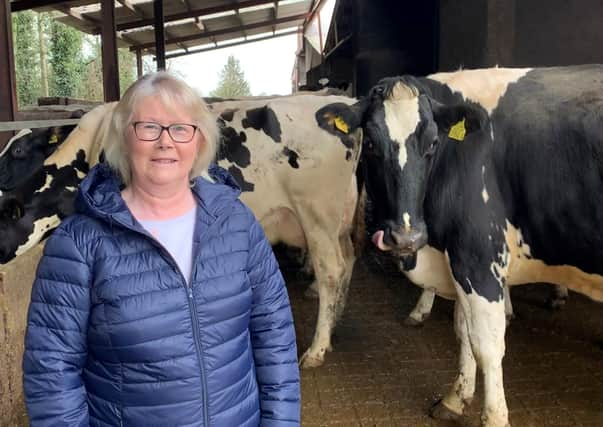“Women weren’t really recognised as the farmer”


Women’s involvement in agriculture has been the way of the world for generations but to say their laborious efforts which lightened their partner’s load and helped sustain a home financially flew under the radar, is an understatement. The Ulster Farmers’ Union Women in Agriculture initiative was created to recognise and celebrate women’s contribution to the industry. Taking a walk down memory lane rural affairs chair Jennifer Hawkes, reminds us why holding a Women in Agriculture webinar series in 2021 is vital to the progression of the industry which has come on leaps and bounds.
Heritage
Jennifer’s parents were children of the post-world war one era and on-farm responsibility came very early for her mother.
Advertisement
Advertisement
Jennifer says: “My mother’s father was an agricultural contractor. Her mother passed away when she was a child and she was relied on from an early age to keep the home and do farm chores when her father and brother were at work ‘on the country’.
“My mother was a competent stock woman and hand milked the cows. She tended the horses which were used for ploughing before they purchased a tractor, grew the vegetables, and helped with harvest. Growing up, I hadn’t realised the important role she played on her home farm although her father and brother were recognised as the farmers. My mother, like most women, was pivotal to the farm business as well as the home, but was very much in the background of agriculture.”
Childhood years
Jennifer’s mother and father both from farming backgrounds, married in the early 1950’s and bought their own farm. Time moved along but women’s place in agriculture altered very little.
“When I was growing up in the 60s and 70s, women were ‘stay at home mum’s’ and played an important role in the running of the farm business as well as the home, especially if their husband had to work off farm to supplement the farm income.
Advertisement
Advertisement
“There was a time frame when it was almost unheard of for a woman to attend the mart or speak with the bank manager and it most certainly was not a young girl’s place to be in the calving pen. Women weren’t really recognised as the farmer and their work was often taken for granted. Many had excellent livestock skills that they learnt over the years, but it was seen as the man’s role to take the lead and deal with farming matters whilst the woman assisted but stayed in the background.”
Helping out
Jennifer and her brother did regular jobs on the farm including feeding the youngstock and assisting with hay and silage. There are a couple of memories that remain particularly vivid.
“I remember being allowed to hand milk the quiet cows and help with the cooling process in the dairy before the creamery cans were sent to the creamery for processing. I particularly enjoyed driving the tractor whilst we collected the bales of hay around the fields!” says Jennifer.
Changing times
The traditional approach of the farm being passed on to the oldest son may have played a part in keeping women in the background of farming, but the tide is changing with support from the wider industry.
Advertisement
Advertisement
“Quite often there would have been a daughter very capable of taking on the farm but because of the old-fashioned stigma attached to farming, it would have been offered to a male relative with a dowry often being given to the daughter and their business expertise was left unrecognised. Thankfully there has been a shift away from this traditional type of farm family succession plan in the past 20 years and the changes since the late 1970’s have been great with veterinary, agricultural and food technology courses giving women equality in the workplace and wider industry.
“Women’s capabilities, their practical experience and educational achievements are becoming more recognised. They are innovative with diversification plans and are resilient and resourceful when times are difficult within the industry. Not forgetting many women in agriculture multitask family life with the rigours of working in a traditionally male dominated industry.”
UFU Women in Agriculture conference
The rural affairs committee is responsible for the UFU Women in Agriculture initiative. While plans for a physical event have been adapted to the unprecedented times, it has its benefits and helps keep the momentum going.
“A virtual event gives us scope for a larger audience as we aren’t limited by the venue’s capacity or COVID-19 restrictions. The conference is open to everyone - women and men of all ages. Participants can view the sessions from the comfort of their own home as many nights as they wish and will be able to ask questions and get actively involved.”
Advertisement
Advertisement
Through hard work, dedication and a love for what they do, women are managing farm businesses and holding leadership roles in many areas of the industry today. The UFU Women in Agriculture events provides essential support to ensure women of all ages can continue to excel in agriculture.
“I feel it’s important that we bring together influential speakers from the industry to share their views and business knowledge to help empower our women working in the agricultural field. The sharing of ideas and experiences helps create an inspirational platform for participants and reinforces the valuable contribution they make to a diverse industry where merit and talent are the key components of leadership.”
Webinar speaker line-up
14, 21 and 28 April
Veronica Morris Rural Support, Norma Rowan Embrace and Michelle Shirlow Food NI will discuss Resilience and Resourcefulness.
Chloe Dunne and Ester Skelly Smith will recount their experience working in the industry.
Advertisement
Advertisement
Viewers will have an opportunity to enhance their business skills with Nicola Weir, BBC Farming Matters and Claire McCallion, PFK-FPM.
Booking
Booking is via the UFU website www.ufuni.org/events
If you have difficulty booking online, please contact Heather Stewart at UFU HQ on 028 9037 0222.